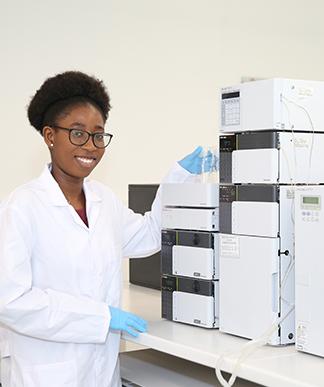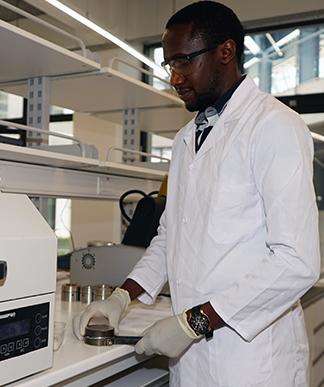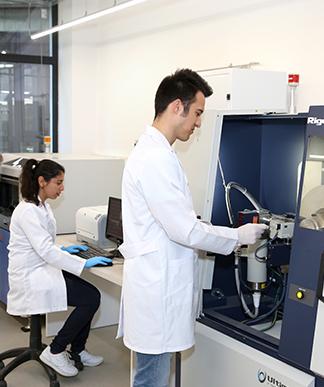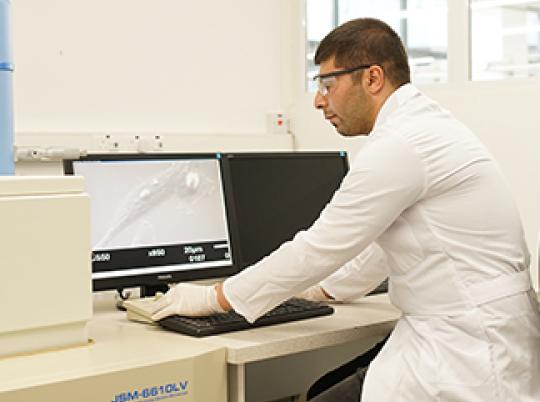


About the Program
Environmental engineering is a branch of engineering that examines and finds solutions to environmental pollution; the primary problem of our age. Today, in the world, there is a need for engineers with expertise in checking drinking water quality, wastewater and solid waste control, air and soil pollution. Studies have been carried out on ecological balance, energy, food and water conservation, recycling, and the effective and efficient use of edible resources. Environmental Engineering is a practice-oriented department like the other branches of engineering. Most of the courses offered in the 3rd and 4th years are fostered by various projects, practices, and internships that are carried out durıng the summer. Graduates will be able to put their theoretical knowledge gained during their 4 years-of-study into practice and research, so they can find solutions to current problems.
Education Opportunities
The Department of Environmental Engineering at Cyprus International University, aims to train students who are able to work in the design, operation, supervision and construction of engineering structures and systems,who can ensure the recovery of the degraded environment and prevent pollution. Throughout the four-year curriculum, students are offered courses and projects in the main areas of water and waste water treatment plants, water networks, design of transmission lines, solid waste control, modelling and control of air pollution, environmental management and planning, and noise pollution control. Students study the theoretical input as well as practical courses, and graduation projects in the analysis laboratory, computer rooms, and the library. Environmental engineers have an important role in making the world a better place to live in and achieving the objectives of sustainable development. Students receive an education in line with these goals, helping them understand the importance of their profession.

Career Areas
After graduation, students who studied environmental engineering can find work in public or private institutions or establish their own businesses, in which they undertake project design, implementation, and environmental management. As they study in the Department of Environmental Engineering, graduates can start their careers in the control of drinking water quality, sewage, the design and construction of storm water networks, as well as the selection, design, construction and operation of domestic and industrial wastewater treatment systems, noise pollution control, air pollution and its control. Graduates of the department can take part in multidisciplinary projects and take on responsibility for the legal, political and managerial roles of these projects.
Contact
Faculty of Engineering
Science and Technology Center, ST 226
Tel: +90 392 671 1111 Extension: 2401
Faculty E-mail: secretary-fe@ciu.edu.tr
Head of Department: Assoc. Prof. Dr. Ayşe Pekrioğlu BALKIS
Head of Department E-mail: apekrioglu@ciu.edu.tr
Compulsory Courses
First Semester
GENERAL CHEMISTRY
Course code
CHEM110Credit
4Theoretical
3Practical
2Ects
6INTRODUCTION TO COMPUTING
Course code
CMPE101Credit
3Theoretical
2Practical
2Ects
5ENGINEERING DRAWING
Course code
CVLE101Credit
3Theoretical
2Practical
3Ects
5READING AND WRITING SKILLS-I
Course code
ENGL141Credit
3Theoretical
2Practical
2Ects
4HISTORY OF CIVILIZATION
Course code
HIST100Credit
0Theoretical
2Practical
0Ects
2CALCULUS-I
Course code
MATH101Credit
4Theoretical
3Practical
2Ects
6MODERN TURKISH HISTORY
Course code
TARH100Credit
0Theoretical
2Practical
0Ects
2Second Semester
ORGANIC CHEMISTRY
Course code
CHEM104Credit
3Theoretical
3Practical
0Ects
6READING AND WRITING SKILLS-II
Course code
ENGL142Credit
3Theoretical
2Practical
2Ects
4INTRODUCTION TO ENVIRONMENTAL ENGINEERING
Course code
ENVE100Credit
0Theoretical
1Practical
0Ects
2ENVIRONMENTAL ENGINEERING ANALYTICAL CHEMISTRY
Course code
ENVE104Credit
4Theoretical
3Practical
2Ects
6CALCULUS-II
Course code
MATH102Credit
4Theoretical
3Practical
2Ects
6GENERAL PHYSICS-I
Course code
PHYS101Credit
4Theoretical
3Practical
2Ects
6TURKISH LANGUAGE
Course code
TREG100Credit
0Theoretical
2Practical
0Ects
2TURKISH
Course code
TURK100Credit
0Theoretical
2Practical
0Ects
2Third Semester
FLUID MECHANICS
Course code
CVLE331Credit
4Theoretical
4Practical
1Ects
6ENVIRONMENTAL ENGINEERING CHEMISTRY I
Course code
ENVE201Credit
4Theoretical
3Practical
2Ects
7DIFFERENTIAL EQUATIONS
Course code
MATH203Credit
3Theoretical
3Practical
1Ects
6MICROBIOLOGY
Course code
MICB120Credit
4Theoretical
3Practical
2Ects
6GENERAL PHYSICS-II
Course code
PHYS102Credit
4Theoretical
3Practical
2Ects
6Fourth Semester
HYDROMECHANICS
Course code
CVLE332Credit
4Theoretical
4Practical
1Ects
6ENVIRONMENTAL ENGINEERING CHEMISTRY-II
Course code
ENVE202Credit
4Theoretical
3Practical
2Ects
8ENVIRONMENTAL ENGINEERING ECOLOGY
Course code
ENVE206Credit
3Theoretical
3Practical
0Ects
4NUMERICAL ANALYSIS
Course code
MATH204Credit
3Theoretical
3Practical
1Ects
5INTRODUCTION TO PROBABILITY AND STATISTICS
Course code
MATH205Credit
4Theoretical
4Practical
1Ects
6Fifth Semester
FREE ELECTIVE
Course code
EFEX11Credit
3Theoretical
3Practical
0Ects
4SUMMER TRAINING I
Course code
ENVE300Credit
0Theoretical
0Practical
0Ects
1ENVIRONMENTAL ENGINEERING UNIT OPERATIONS
Course code
ENVE301Credit
4Theoretical
3Practical
2Ects
7ENVIRONMENTAL ENGINEERING HYDROLOGY
Course code
ENVE305Credit
3Theoretical
3Practical
0Ects
5WATER SUPPLY ENGINEERING
Course code
ENVE311Credit
4Theoretical
4Practical
1Ects
7AIR POLLUTION ENGINEERING
Course code
ENVE343Credit
3Theoretical
3Practical
1Ects
6Sixth Semester
FACULTY ELECTIVE
Course code
EFEXX1Credit
3Theoretical
3Practical
0Ects
5ENVIRONMENTAL ENGINEERING UNIT PROCESSESS
Course code
ENVE302Credit
4Theoretical
3Practical
2Ects
7WASTEWATER ENGINEERING
Course code
ENVE322Credit
4Theoretical
4Practical
1Ects
8SOLID WASTE ENGINEERING
Course code
ENVE330Credit
3Theoretical
3Practical
1Ects
6ENGINEERING ECONOMY
Course code
INDE232Credit
3Theoretical
3Practical
0Ects
4Seventh Semester
FACULTY ELECTIVE
Course code
EFEXX2Credit
3Theoretical
3Practical
0Ects
5PROJECT MANAGEMENT
Course code
ENGI401Credit
3Theoretical
3Practical
0Ects
4SUMMER TRAINING II
Course code
ENVE400Credit
0Theoretical
0Practical
0Ects
1PHYSICAL CHEMICAL PROCESSES
Course code
ENVE401Credit
3Theoretical
3Practical
1Ects
6WATER ENGINEERING DESIGN
Course code
ENVE411Credit
4Theoretical
3Practical
2Ects
8HAZARDOUS AND SPECIAL WASTE MANAGEMENT
Course code
ENVE431Credit
3Theoretical
3Practical
0Ects
5Eighth Semester
FREE ELECTIVE
Course code
EFEX12Credit
3Theoretical
3Practical
0Ects
4FACULTY ELECTIVE
Course code
EFEXX3Credit
3Theoretical
3Practical
0Ects
5CAPSTONE PROJECT
Course code
ENGI402Credit
4Theoretical
2Practical
4Ects
8INDUSTRIAL POLLUTION CONTROL
Course code
ENVE420Credit
3Theoretical
3Practical
1Ects
6WASTEWATER ENGINEERING DESIGN
Course code
ENVE422Credit
4Theoretical
3Practical
2Ects
8Elective Courses
ENVIRONMENTAL IMPACT ASSESSMENT
Course code
ENVE402Credit
3Theoretical
3Practical
0Ects
AIR POLLUTION CONTROL PROCESSES
Course code
ENVE304Credit
3Theoretical
2Practical
2Ects
5SOIL AND GROUNDWATER POLLUTION
Course code
ENVE427Credit
3Theoretical
3Practical
0Ects
ENVIRONMENTAL GEOLOGY AND NATURAL HAZARDS
Course code
ENVE430Credit
3Theoretical
3Practical
0Ects
5ETHICS
Course code
INDE335Credit
3Theoretical
3Practical
0Ects
4ENVIRONMENTAL MANAGEMENT
Course code
ENVE407Credit
3Theoretical
3Practical
0Ects
5SOIL AND GRD.WATER POLLUTION
Course code
ENVE427Credit
3Theoretical
3Practical
0Ects
ENVIRONMENTAL CONTROL IN PETROLEUM ENGINEERING ACTIVITIES
Course code
PNGE406Credit
3Theoretical
3Practical
0Ects
0SPECIAL TOPICS IN ENVIRONMENTAL ENGINEERING I
Course code
ENVE494Credit
3Theoretical
3Practical
0Ects
5HEALTH AND SAFETY IN PETROLEUM AND NATURAL GAS ENGINEERING
Course code
PNGE202Credit
3Theoretical
3Practical
0Ects
4CONVENTIONAL AND ALTERNATIVE ENERGY RESOURCES
Course code
PNGE452Credit
3Theoretical
3Practical
0Ects
0ENGINEERING MANAGEMENT
Course code
INDE282Credit
3Theoretical
3Practical
0Ects
4OCCUPATIONAL HEALTH & SAFETY
Course code
INDE492Credit
3Theoretical
3Practical
1Ects
6PROGRAMMING IN MATLAB FOR ENGINEERING
Course code
ENGI316Credit
3Theoretical
3Practical
0Ects
INNOLOGYDUSTRIAL AND ENVIRONMENTAL BIOTECH
Course code
BIOE361Credit
3Theoretical
3Practical
0Ects
3WORLD ENERGY POLITICS
Course code
PNGE451Credit
3Theoretical
3Practical
0Ects
0PUBLIC HEALTH
Course code
ENVE410Credit
3Theoretical
3Practical
0Ects
4COMPUTER AIDED DESIGN
Course code
MCLE475Credit
3Theoretical
2Practical
3Ects
6GEOTHERMAL ENGINEERING
Course code
PNGE391Credit
3Theoretical
3Practical
0Ects
5EASTERN MEDITERRANEAN ENERGY GEOPOLITICS
Course code
PNGE340Credit
3Theoretical
3Practical
0Ects
0CONVENTIONAL AND ALTERNATIVE ENERGY RESOURCES
Course code
PNGE452Credit
3Theoretical
3Practical
0Ects
0TR Applicants
TR Students who are successful in the exams conducted by the Higher Education Council Student Selection and Placement Center (ÖSYM) and are entitled to enroll in our university in line with their preferences can complete the registration process with the necessary documents for registration from our Registration and Liaison Offices throughout Turkey or from the Marketing Directorate on campus.
Click for detailed admission requirements information.
TRNC Applicants
TRNC citizens and TR citizen candidate students who have completed their entire high school education in TRNC. They are placed in undergraduate programs in line with their success in the CIU Student Placement and Scholarship Ranking Exam and the programs they prefer.
Students who are successful in the exam can register from the TRNC Marketing Office.
Applicants can directly apply online to our undergraduate programs using the application portal. Please fill in your details correctly and upload all the required documents listed on the last page of the application form.
Required documents;
- Completed application form,
- Higher/Secondary Certificate or equivalents (e.g. O/A’Level, WAEC/NECO),
- Evidence of English Language competence: TOEFL (65 IBT) or IELTS (5.5). Students without these documents will take the CIU English proficiency exam on campus following arrival,
- Scanned copy of international passport/birth certificate,
- Fully completed and signed CIU Rules and Regulations document (which can be downloaded during the online application).
Cyprus International University provides academic scholarships for its students as an incentive for success, with most students benefiting from 50%, 75% or 100% scholarships or discounted tuition fees. Click for more information.
Tuition Fees are determined at the beginning of each academic year. Candidate students who are entitled to enroll in CIU can learn their fees in line with the Tuition Fee Calculation system.